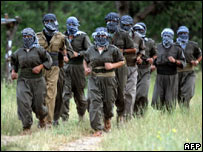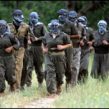
AKP GOVERNMENT CAUGHT BETWEEN A ROCK AND A HARD PLACE ON RESPONSE TO PKK ATTACK
Publication: Eurasia Daily Monitor Volume: 4 Issue: 197
By:

Hundreds of thousands of Turks took to the streets in towns and cities across the country yesterday (October 23) to protest the killing of 12 soldiers in an attack by the Kurdistan Workers’ Party (PKK) on October 21 (see EDM, October 22). They also called for a military strike against the organization’s headquarters in the Qandil Mountains of northern Iraq. The continuing public pressure has now made it almost impossible for Turkish government not to be seen to taking decisive measures against the PKK. Yet any course of action will come with a price.
There is little doubt that Prime Minister Recep Tayyip Erdogan’s personal and political instincts are in favor of a military operation into northern Iraq. Although his Islamist sentiments — particularly his youthful radicalism — tend to receive more publicity, Erdogan is also a committed Turkish nationalist. Yet, despite his landslide election victory on July 22, Erdogan is also aware that, when it occurs, the main challenge to his ruling Justice and Development Party (AKP) will come from the nationalist right of the political spectrum.
Although Turkish secularists accuse the AKP of having long-term plans to erode the principle of secularism enshrined in the current Turkish constitution, such accusations tend to resonate more with Turkey’s elite than with the masses who comprise the AKP’s grassroots support, not least because the majority of them are already very religious. However, it is also among the lower-income groups that nationalist feelings tend to be the strongest.
The most emotional of the dozens of public protests yesterday were at the funerals of the 12 soldiers slain in the October 21 attack. Services were held in 11 of Turkey’s 81 provinces. Significantly, as was the case with the 13 Turkish commandos killed in a PKK ambush on October 7, all of the soldiers who were buried yesterday came from lower-middle class or working-class backgrounds. To put it another way, the soldiers who are dying are coming from the AKP’s core constituency.
The last 18 months had already witnessed the rise of a bruised and increasingly strident nationalism in Turkey. It had undoubtedly been exacerbated by the public sense of rejection by the EU and, more recently, by what was widely regarded as the national humiliation of the U.S. House of Representatives Foreign Affairs Committee’s approval of a motion describing the killing of Ottoman Armenians as genocide. But its main focus had been the continuing death toll exacted by the PKK, which is operating out of northern Iraq. To make matters worse, the repeated warnings to Ankara by Washington not to launch a military operation against the PKK’s camps, meant that most of the Turkish population regarded the organization as operating at least under the de facto protection of the United States.
The recent PKK attacks have sparked a further spike in nationalist sentiment. In addition to the public protests, the streets of Turkey are now festooned with Turkish flags, hung not only between lampposts by local authorities but also from a large proportion of residential apartments. Flag manufacturers estimate that, in a nation of approximately 73 million, they have sold around 15 million Turkish flags since October 21 (Milliyet, Radikal, October 24).
But, regardless of the international repercussions, the AKP also faces a possible backlash within its own ranks if decides to launch a cross-border military operation. One of the most remarkable aspects of its July 22 election triumph was that the AKP appeared to have bridged the nationalist divide in Turkey. Even though leading figures such as Erdogan are known to be Turkish nationalists, the AKP nevertheless emerged as the largest party in the predominantly Kurdish southeast of the country. The main reasons appear to have been the fact that AKP fielded ethnic Kurds as candidates and that it has the image of being a religious party, which plays well in the most conservative region of Turkey. As a result, around 100 of the AKP’s 341 MPs are believed to be of Kurdish origin.
Even if they dislike the PKK as an organization, most of the population of southeast Turkey are opposed to a military incursion into northern Iraq and would prefer a peacefully negotiated settlement, including some form of amnesty for PKK militants. This is partly because they fear that an invasion will ultimately lead to an escalation of violence and partly because almost all have a friend or relative who is, or has been, involved with the PKK.
In addition to military action, the AKP is also under intense pressure to impose economic sanctions on northern Iraq, including closing the border gate at Habur. In the wake of the October 21 attack, many company owners and heads of business associations have expressed their willingness to sacrifice their profits and curtail their economic ties with northern Iraq if, by doing so, they are serving the national interest (Hurriyet, Milliyet, October 23). However, their enthusiasm is not shared by the masses of southeastern Turkey; for many of whom trade with northern Iraq represents not extra profits but their livelihood. Mehmet Kaya, chairman of the Board of Commerce and Industry in Diyarbakir, the largest city in southeast Turkey, estimated that transportation alone provided employment for 200,000 people in the region. “The region has a trade volume of $2.5 billion with Iraq,” he said. “About 60 percent of the 300,000 tankers and transportation vehicles work for Iraq. Will 200,000 people sit at home if Habur is closed?” (Referans, October 24).
Unless the AKP responds to the pressure from Turkish nationalists among its grassroots, it risks seeing their support shift to the ultranationalist Nationalist Action Party (MHP). But if it takes military action or imposes economic sanctions on northern Iraq, the AKP risks alienating a sizeable proportion of the population of southeast Turkey and undoing one of its greatest achievements in the election of July 22.




